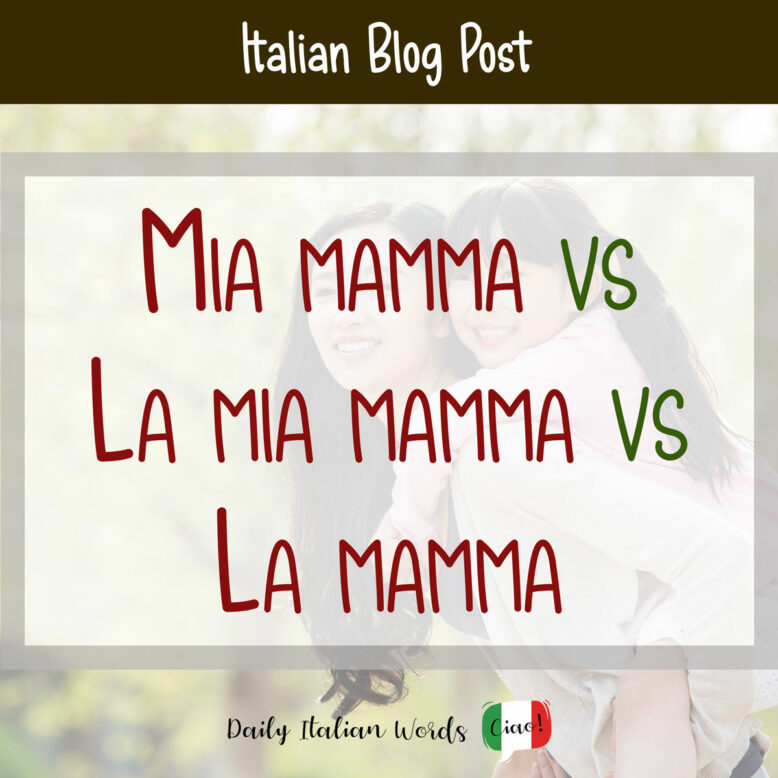One of the cardinal rules Italian learners are taught from day one is that possessive adjectives always require a definite article, or the equivalent of “the” in Italian, when they precede the noun being modified.

For example:
- il suo vicino = his/her neighbour (literally: the his/her neighbour)
- la mia casa = my house (literally: the my house)
- i nostri amici = our friends (literally: the our friends)
- le loro tazze = their cups (literally: the their cups)
However, there is one glaring exception to this rule, which is members of the family in the singular. Unlike other nouns, they do not require a definite article. Here are some of the most important family members in Italian:
This means that, for example, you must say mia figlia (my daughter) without the definite article, not la mia figlia.

Of course, a rule wouldn’t be a rule without at least one exception, and in this case, we actually have four! In each of these cases, the definite article is required:
1. The family member is modified by a prefix, such as bis- or pro-.
- mio nonno = my grandfather (no definite article)
- il mio bisnonno = my great-grandfather (definite article required)
- mio zio = my uncle (no definite article)
- il mio prozio = my great-uncle (definite article required)
2. The family member is modified by a suffix, such as -ino/a (to indicate smallness) or -one/a (to indicate largeness).
- mia mamma = my mom (no definite article)
- la mia mammina = my sweet little mommy (definite article required)
- tuo fratello = your brother (no definite article)
- il tuo fratellone = your big brother (definite article required)
3. The family member is modified by another adjective, such as caro (dear), vecchio (old), birichino (cheeky), and so on.
- nostro padre = our father (no definite article)
- il nostro caro padre = our dear father (definite article required)
- mia nonna = my grandma (no definite article)
- la mia vecchia nonna = my elderly grandma (definite article required)
4. The possessive adjective is loro (their).
- la loro nonna = their grandmother (definite article required)
- i loro figli = their sons / children (definite article required)
Source: Transparent Language

“But people – especially children – use la mia mamma or il mio papà/babbo all the time” I can hear you yelling from the back, and you’d be right!
According to Italian grammar books, certain family member names are considered affectionate forms: for example, mamma (mom / mommy) is the affectionate form of madre (mother), while papà and babbo (dad / daddy) are the affectionate forms of padre (father).
For this reason, it is considered acceptable to use them with the definite article, just like the forms with the suffixes in section two.

Yet another form that is considered acceptable these days is “definite article + family member” without the possessive adjective. Indeed, you will often hear people refer to their own mother as simply la mamma rather than mia mamma or la mia mamma.
However, keep in mind that dropping the possessive adjective is very colloquial, mainly occurs between friends or close family members, and can only be done if there is no ambiguity about which family member is being discussed.
Amico 1: Come sta la mamma? – Amico 2: Bene grazie, l’ho sentita ieri.
Friend 1: How is your mom? – Friend 2: She’s well, thanks, I heard from her yesterday.
And what about the expression Mamma mia! with the possessive adjective and noun inverted? Well, it has a completely different meaning entirely as you’ll find out in our dedicated article.
Heather Broster is a graduate with honours in linguistics from the University of Western Ontario. She is an aspiring polyglot, proficient in English and Italian, as well as Japanese, Welsh, and French to varying degrees of fluency. Originally from Toronto, Heather has resided in various countries, notably Italy for a period of six years. Her primary focus lies in the fields of language acquisition, education, and bilingual instruction.


